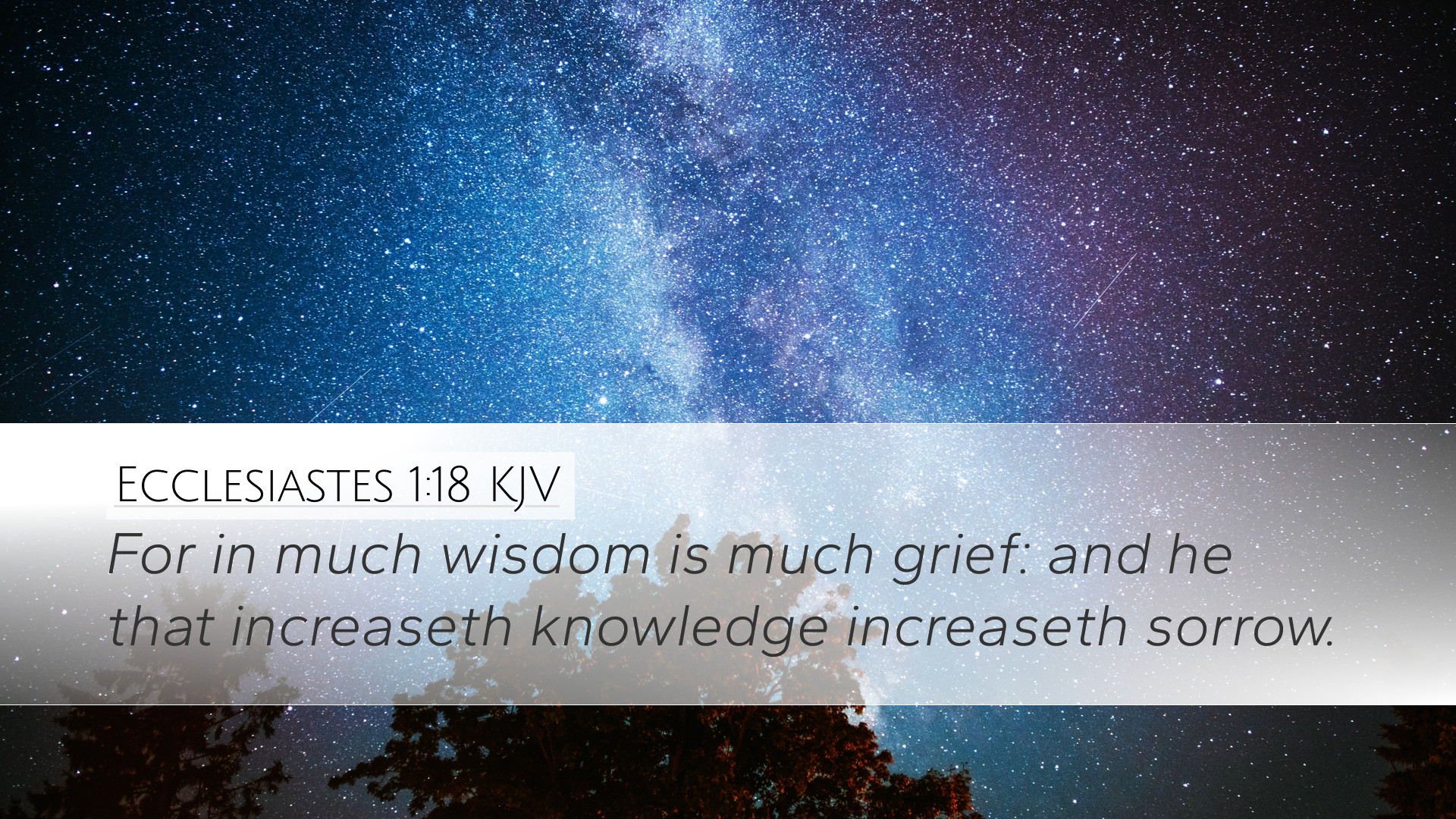Commentary on Ecclesiastes 1:18
Verse Reference: Ecclesiastes 1:18
Verse Text: "For in much wisdom is much grief: and he that increaseth knowledge increaseth sorrow."
Overview
The book of Ecclesiastes, traditionally attributed to King Solomon, addresses the question of the meaning and purpose of life. In this context, Ecclesiastes 1:18 presents a profound insight into the burdens of wisdom and knowledge. This commentary draws from the insights of Matthew Henry, Albert Barnes, and Adam Clarke to explore the depth of this passage.
Exegetical Insights
Matthew Henry’s Commentary
Henry emphasizes the proverbial nature of this saying, indicating that increased wisdom often leads to greater sorrow. He suggests that with wisdom comes the awareness of life's vanities and the inherent troubles of human existence. Those who are wise are more acutely aware of the moral and existential failings of themselves and others, leading to an inevitable burden of grief.
Albert Barnes’ Commentary
Barnes elaborates on the relationship between wisdom, knowledge, and grief. He notes that while the pursuit of knowledge can lead to enlightenment, it can also expose one to the harsh realities of life, including the inevitability of suffering and death. Barnes points out that the wise man senses more deeply the injustices and calamities of the world, which can lead to a heart filled with sorrow rather than joy.
Adam Clarke’s Commentary
Clarke discusses the dual nature of wisdom and knowledge. While they can be valuable, he warns that they can also lead to despair if one becomes overly focused on the challenges and sorrows of life. Clarke argues that wisdom should not only be seen as a source of grief but also as an opportunity for solace and understanding, emphasizing the importance of balance in one's pursuit of knowledge.
Theological Themes
- The Burden of Knowledge: The verse underscores the idea that greater understanding can bring with it a sense of burden. This theme resonates throughout Ecclesiastes as the author reflects on the futility of worldly pursuits and the weighty consequences of insight.
- The Nature of Suffering: The acknowledgment of sorrow as a byproduct of wisdom invites a deeper reflection on human suffering. The text implies that wisdom is not just about accumulating facts but understanding the complexities of life, which can lead to grief.
- Hope Amidst Grief: While the verse speaks to the sorrow linked with wisdom, it simultaneously opens the door for a discussion about hope and redemption in the midst of suffering. Pastors can draw connections to the comfort found in Christ amidst worldly sorrow.
Pastoral Applications
For pastors and theologians, Ecclesiastes 1:18 serves as a reminder of the complexities of life and the role that suffering plays in the human experience. It prompts leaders to consider how to shepherd their communities through grief and sorrow while also encouraging the pursuit of wisdom. Some key applications include:
- Encouraging congregations to embrace the reality of sorrow as a part of the human condition and an aspect of spiritual growth.
- Promoting a balance between the pursuit of knowledge and the recognition of its potential to cause distress, advising members to seek wisdom in faith rather than solely in worldly understanding.
- Offering pastoral care and counseling to those who may be struggling with the burdens of wisdom and grief, helping them to find peace in their knowledge.
Summary
In conclusion, Ecclesiastes 1:18 presents a significant insight into the relationship between wisdom, knowledge, and sorrow. As noted by Matthew Henry, Albert Barnes, and Adam Clarke, greater wisdom can lead to a deeper awareness of the troubles of life, which evokes grief. However, this grief can also be a catalyst for spiritual growth and deeper understanding of God’s purposes amidst suffering. The key for believers lies in navigating these tensions, seeking wisdom not just for knowledge’s sake but as a means to a more profound connection to the divine amidst life’s complexities.


